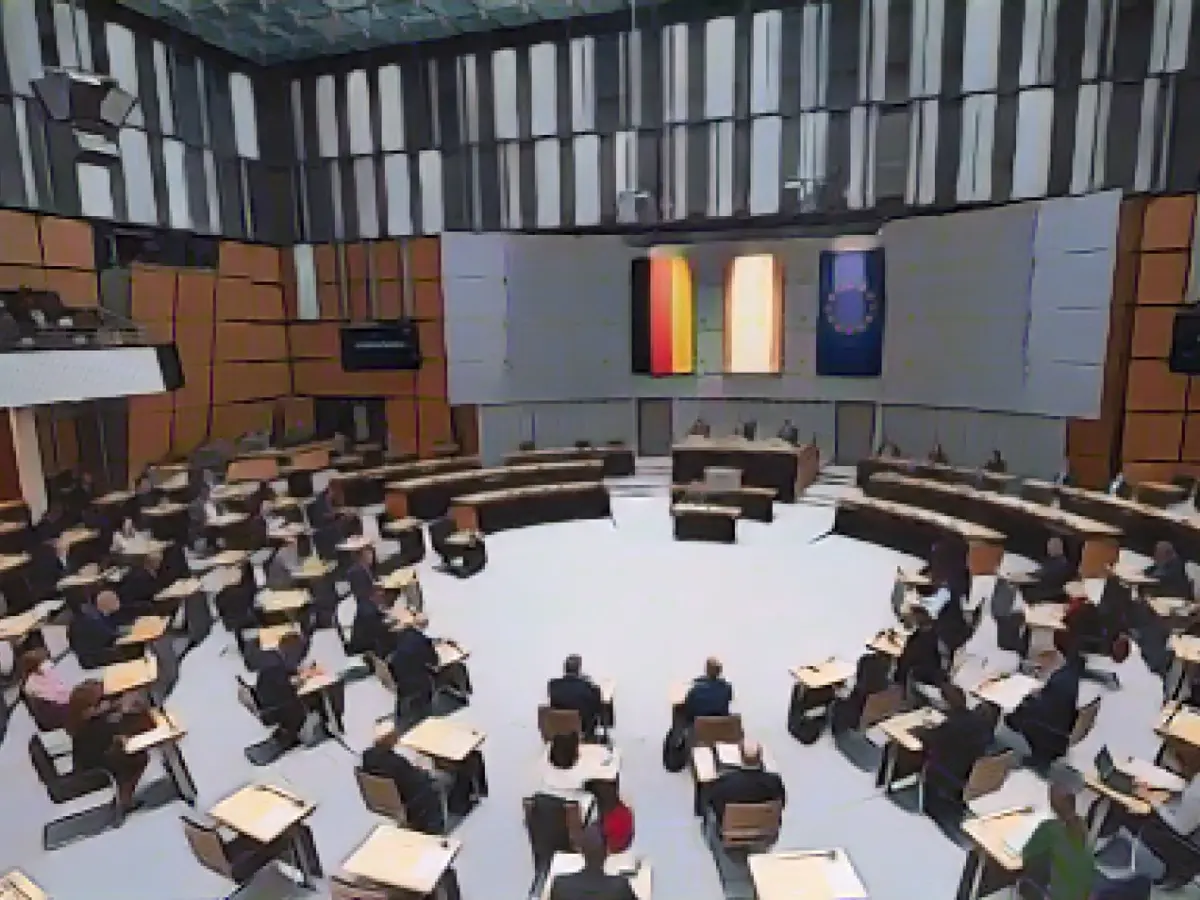Title: The House of Representatives Faces Criticism Over Budget Plan
As the House of Representatives prepares to vote on Berlin's 2024/2025 double budget on Thursday, both business and social associations have voiced their dissatisfaction.
The Chamber of Industry and Commerce (IHK) in Berlin asserts that the proposed budget is riddled with uncertainty due to its substantial savings requirements, temporary financing pauses, and depletion of reserves. According to IHK President Sebastian Stietzel, "The budget's enormous volume is only possible due to significant, yet still largely undetermined savings requirements, the temporary halt to all long-term financing commitments, and the depletion of all remaining reserves."
While Stietzel welcomes measures like increasing staff at the State Office for Immigration and establishing a digital citizens' office, he claims that the budget lacks a comprehensive focus on vital investments such as education, adequately equipping the administration, and infrastructure suitable for a metropolis. To tackle the budget's deficiencies, the IHK suggests dispensing with the 29-euro ticket, which is set to come into force in 2024, and saving money by reducing bureaucracy.
On the other hand, Berlin's leading associations of independent welfare organizations (LIGA) are concerned about potential cuts to social institutions and projects. They are primarily worried about the so-called flat-rate reduction in expenditure, which, according to the draft budget, will require a reduction of approximately 1.9 billion euros from the annual budget of around 40 billion euros in 2024 and 2025. The precise strategy for achieving these savings remains unclear, and LIGA members fear that the social sector will bear the brunt of the cuts.
Contrary to the concerns expressed by social associations, the coalition parliamentary group heads, Dirk Stettner (CDU) and Raed Saleh (SPD), have stressed that the new budget does not include any social cuts. Rather, social affairs hold a central focus within the budget.
Related Articles:
- The Chamber of Industry and Commerce (IHK) in Berlin presses for increased investment in education, administration, and infrastructure, despite some promising measures like boosting State Office for Immigration staff and setting up a digital citizens' office.
- Berlin's independent welfare organizations, grouped within LIGA, express concerns over potential cuts to social institutions and projects due to the flat-rate reduction in expenditure, which could significantly impact services for vulnerable individuals.
- The heads of the coalition parliamentary groups in Berlin, Dirk Stettner (CDU) and Raed Saleh (SPD), assure that the new budget does not include any social cuts, and social affairs serve as a key focus area.
Source:
Enrichment Data
While the Chamber of Industry and Commerce in Berlin is not explicitly recognized in the search results, European Parliament members offer the following criticisms and suggestions in response to the budget plan:
- Investments in Industry and Infrastructure:
- Massive Investments: Martin Schirdewan from The Left party advocates for substantial investments in industry, infrastructure, and sustainable transportation to safeguard millions of jobs and ensure reliable train services across European cities.
- Digital Revolution: He encourages a European digital revolution rather than Europe lagging behind technologically or falling under the control of tech billionaires.
- Social Investments:
- Public Investments: René Aust from the ESN faction emphasizes the importance of public investments in social programs, including affordable housing, public healthcare, and public transportation.
- Public Control: He criticizes the current approach for prioritizing private interests and foreign direct investments over public control.
- Green Deal and Climate Protection:
- Green Ambitions: Kira Marie Peter-Hansen from the Verts/ALE group stresses the necessity of green ambitions to meet the Paris Agreement targets.
- Polluter Pays Principle: She emphasizes the need for stringent environmental legislation and ensuring that polluters pay for their actions.
- Simplification and Deregulation:
- Simplification Critique: Sebastiaan Stöteler from the PfE group faults the emphasis on simplification, arguing that deregulation could undermine national sovereignty and economic regulation.
- Transparency and Accountability: He stresses the need for the Commission's decisions to be more transparent and accountable to the Parliament.
- Concrete Actions:
- Investments in Human Resources: Numerous members highlight the importance of investing in human resources, emphasizing education's role in a self-confident Europe.
- Concrete Measures: Christine Anderson from the ESN faction criticizes the absence of concrete actions in the budget, suggesting that the Commission's decisions should be more transparent and accountable to the Parliament.
In light of these criticisms and suggestions, while the Chamber of Industry and Commerce in Berlin is not explicitly mentioned, the need for significant investments in industry, infrastructure, social programs, and climate protection, alongside a more equitable balance between simplification and deregulation, emerges as a common theme.








